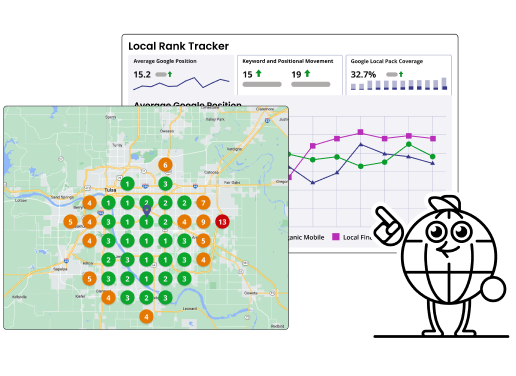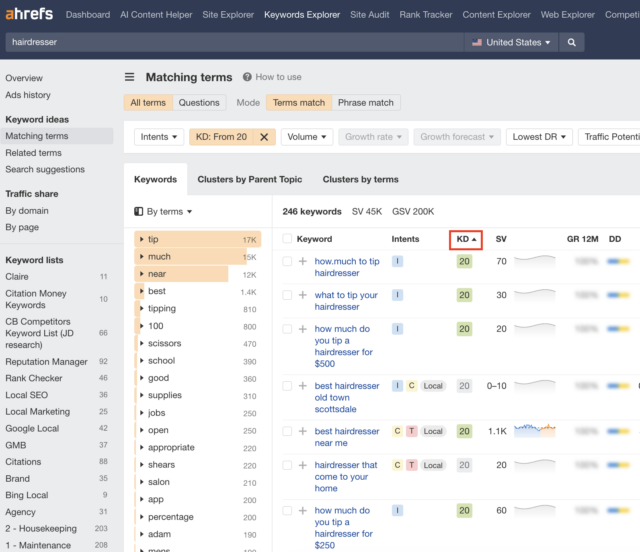
How to Do Local Keyword Research: Step-by-step
Keyword research is one of the major cornerstones of marketing success for any local business targeting greater visibility in the local search results.
If you’re looking for ways to boost your local website’s local pack presence, or simply set up local rank tracking, a well-organized local keyword research process is the first step towards achieving that goal.
What are keywords?
Keywords are the words and phrases that searchers enter into search engines, such as Google, to find the answers or information that they’re looking for.
Anything searched for on a search engine, whether a single word or a phrase, is considered a keyword. For example, if you were looking to buy a new pair of trainers, you might type something like ‘women’s black trainers’.
Keywords are important because they help your website to show up when people type them into search engines.
As a business owner or agency professional, you want the keywords on your or your client’s web pages to be relevant to what people are searching for so you have a better chance of ranking higher in SERP results.
Most people have some idea of the keywords they want to rank for. But it’s impossible to know everything people search for. That’s why it pays to do some research to find more relevant keywords.
Prefer video?
If you’re someone who prefers to learn via video, we’ve got you covered. Check out local search expert Claire Carlile’s BrightLocal Academy course, ‘How to Master Local Keyword Research‘. You can even get a local keyword research template to take some of the effort out of the process!
Take a look at the video below for a sample lesson, and enroll in the free online video course today.
What is local keyword research?
Local keyword research is a process conducted by local businesses to find the search terms that consumers in the local area use when searching for nearby local businesses, products, and services. It helps local businesses to correctly target their SEO efforts so they are more visible to local consumers in their moment of intent.
Learnings from local keyword research can heavily impact on-page SEO, as well as how pages are organized and shaped—or what we call the ‘information architecture’. It also affects how you present your business, products, and services in your offline and online marketing materials.
However, you must follow a good process when identifying keywords. Basing your keyword selection on guesswork exposes you to the risk of using incorrect terms, having to narrow a keyword base, and failing to account for all variations of relevant search phrases.
On the other hand, when done right, local keyword research allows you to:
- Understand search behavior better.
- Deepen your understanding of your target audience.
- Find related markets to expand into, and/or refocus your products or services to.
- Discover more ways to attract local consumers.

Put Your Rankings on the Map. Literally.
Track and improve rankings with BrightLocal
Keywords in Context
Before we begin keyword research, it’s important to cover how search has changed and the context of keyword research today.
We need to keep in mind that searcher behavior isn’t fixed, and the queries people use, the length of those queries, and the context in which the searches are made are constantly changing. Because of this, keyword research is never a ‘one-and-done’ process.
Take, for example, the explosion of mobile search. Mobile devices now account for approximately half of web traffic worldwide, and Google asserts that a third of mobile searches are related to location.
Google coined the term ‘micro-moments’ to describe when people turn to their smartphones:
- I-want-to-know moments
- I-want-to-go moments
- I-want-to-do moments
- I-want-to-buy moments
Google tells us that searches for local businesses have grown by more than 80% year over year, including searches for “near me” and “support local businesses”. And searches for “who has” + “in stock” have grown by more than 8,000% year on year!
However, we also need to understand that how people find information online is fragmenting, with more using social channels like Instagram and YouTube than ever before, and searchers using conversational AI tools like ChatGPT are on the rise, too. It’s within this context that it’s important to remember that while the keywords we’ll be discovering and honing today are based on searcher activity in Google, that’s not where the story ends. The best keyword research is ongoing, and takes in a variety of platforms aside from Google.
It also means that hanging your hat on one, short exact-match keyword like ‘pest control’ may not be advised. The rise of AI may see much longer and more complex queries become more frequent.
With all the ‘what is’ and ‘why’ out of the way, let’s get to the best process for researching local keywords.
Want to get technical?
If you’re confident in your keyword research skills, check out Andy Simpson’s fantastic guide on how to use Google Search Console and Looker Studio (formerly Google Data Studio) together to create some seriously clever keyword research dashboards—perfect if you’re looking to impress your clients!

How do you use keyword research for local SEO?
Local keyword research revolves around identifying three parts of your target search queries: your core term, the keyword modifier, and your location.

You can use keyword research tools to automate the process of building long keyword lists and gathering helpful data such as search volumes and difficulty levels.
Many tools will also offer additional features such as associated keywords, questions people ask, and changes in search volume over time. This can help you spot emerging trends and act quickly to target newly popular keywords.
Popular local keyword research tools include Ahrefs, SEMrush, Serpstat, Kparser, and Moz.
Here are the key steps you need for local keyword research:
- Identify your core term
- “Extend” your core terms with keyword modifiers
- Add your locations
- Organize your relevant keywords by search intent
Step 1: Identify your core term
Your core term is the ‘what’ of your business. For example,
- If you are a local hair salon, your core terms are “hairdresser”, “haircut”, “hairstylist”
- If you are a law firm, your core terms are “lawyer”, “law firm”, “attorney”
You can use your own knowledge of your niche to begin generating a list of core terms. Once you have your own list, do a Google search using some of those terms and note down any keywords that your competitors are using that aren’t already on your list.

Step 2: “Extend” your core terms with keyword modifiers
This modifier makes your core term more specific. It also makes the keyword less competitive. For example:
- “Best hairdressers near me”
- “Find a personal injury lawyer” (keyword modifiers are in italics).
Keyword modifiers make your overall keyword strategy more diverse. They make it easier to pinpoint less competitive terms, which can be easier to rank for.
Keyword difficulty reflects the organic competitiveness of a search query. It is usually calculated based on the assumed “power” of top-ranking domains and pages.
If you’re using a keyword research tool like Ahrefs, filter the list by keyword difficulty to find less competitive terms:

Step 3: Add your locations
The location component is the name of the towns, states, counties, and communities your business is located in. For example:
- “Best hairdresser in Albany” and
- “Find a personal injury lawyer in NY”
There are several ways to generate appropriate location-based keywords.
If you have Google Analytics installed on your website (or other Analytics package), this can tell you which locations are generating the most clicks to act as a starting point.
A Google search for a specific location will then show you additional destinations and a ‘people also search for’ snippet to expand your pool.

Step 4: Organize Your Relevant Keywords by Search Intent
Search intent reflects the user’s goal behind a search query.
There are three types of search intent:
- Commercial (also referred to as transactional and high intent): This is when a user is ready to take an action such as place an order or call for services).
- Informational: This is when a user wants to learn something, research their options, or find answers to their questions.
- Navigational: This is when a user wants to go to your site (these are search phrases that contain your brand or product name).
Assigning keywords to one of these three types of intent makes it much easier to know when a keyword should be used. An information keyword, for example, may be the focus of a piece of content that shows the reader how to solve a particular problem, or answers a question.
With steps one to four completed, you now have a well-researched, relevant, and up-to-date keyword list to aid in your local SEO efforts. Keep in mind that this list should be checked and updated at regular intervals to ensure that you aren’t missing any opportunities to include new search terms within your local SEO campaign.